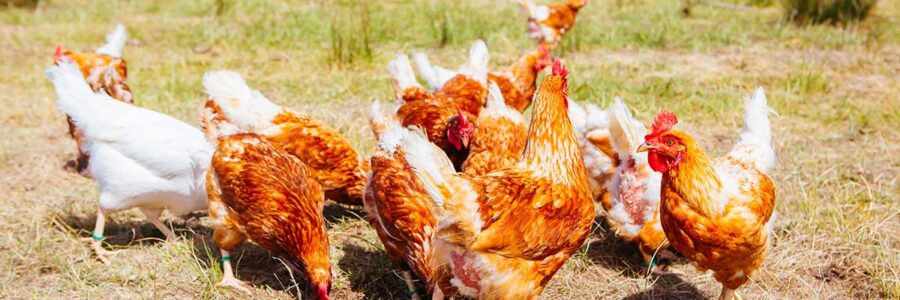When shopping for eggs, the variety of labels can be confusing—cage-free, free-range, organic, and pasture-raised are just a few options. While many consumers opt for cage-free or free-range eggs, thinking they’re making a healthier and more ethical choice, these labels often don’t deliver the benefits they promise. Pasture-raised eggs are the option you should be looking for to get the most nutritious eggs and support better animal welfare.
Let’s break down what these common egg labels mean and explore why pasture-raised eggs are superior for health and ethics.
Understanding Cage-Free and Free-Range Eggs
Cage-Free Eggs: Cage-free eggs are often seen as a step up from conventional eggs, but there’s more to the story. In a cage-free system, hens are kept in large indoor barns or aviaries, not confined to small wire cages. While this allows them more space to move around, it doesn’t necessarily mean they have a good quality of life or access to a natural diet.[1]
Cage-free hens typically live indoors and are fed a diet of grains. They don’t have the opportunity to forage for insects or plants, which limits the nutritional value of the eggs they produce. While cage-free eggs may be marketed as a better option, they don’t offer the same health benefits as eggs from hens with access to outdoor foraging.
Free-Range Eggs: The free-range label suggests that hens can roam freely outdoors, but the reality can be quite different. In many cases, free-range hens can only access a small outdoor area, which may be concrete or dirt rather than grassy fields. Additionally, hens may spend little time outside, and their diet may still be grain-based.[2]
This limited outdoor access means free-range eggs are often less nutritious than cage-free eggs. The lack of natural foraging reduces the variety of nutrients available to the hens, resulting in eggs that are less rich in essential nutrients.
The Nutritional and Ethical Benefits of Pasture-Raised Eggs
Pasture-raised is the way to go for those who want the most nutritious and ethically produced eggs. Pasture-raised hens are given ample outdoor space to roam and forage naturally, consuming a diverse diet that includes insects, seeds, and grasses. This natural diet is key to producing superior eggs in taste and nutrition.[3]
Nutritional Highlights: Pasture-raised eggs stand out for their rich nutrient profile, offering:
- Omega-3 Fatty Acids: These eggs are higher in omega-3 fatty acids, which support cardiovascular and brain health.
- Vitamins and Antioxidants: Pasture-raised eggs are packed with vitamins A, D, and E, as well as antioxidants like lutein and zeaxanthin, which are crucial for maintaining good health.[4]
- Better Fatty Acid Ratio: The improved omega-6 to omega-3 ratio in pasture-raised eggs helps reduce inflammation and supports overall well-being.
- Nutrient-Dense Yolks: The bright orange yolks of pasture-raised eggs indicate their superior nutrient content, including high levels of carotenoids.
Ethical Farming Practices: Beyond their nutritional benefits, pasture-raised eggs are produced in a way that is more humane for the hens. These hens are allowed to live more naturally, engaging in behaviors like foraging and dust bathing, contributing to their overall health and happiness. Pasture-raised farming is often more environmentally sustainable, utilizing practices that enhance soil health and reduce the need for synthetic inputs.
How We Choose Our Eggs
For our family, sourcing the healthiest eggs means sourcing them directly from local farmers who raise pasture-raised hens. By buying locally, we not only get fresher eggs but also support farmers who are committed to humane and sustainable practices. Many of these farms raise heritage breeds, which produce eggs in a range of beautiful colors and are known for their exceptional flavor and nutrient density.
Bonus Tip: Recycle Eggshells for Your Garden
Don’t toss those eggshells! After enjoying your pasture-raised eggs, save the shells for your garden. Crushed eggshells are a natural source of calcium and can help prevent blossom end rot in tomatoes. Simply crush the shells and sprinkle them around your plants or mix them into the soil.
Conclusion: Invest in Your Health with Pasture-Raised Eggs
When it comes to eggs, not all are created equal. While cage-free and free-range options may seem better, they often need more nutrition and ethics. Pasture-raised eggs, on the other hand,
References:
- Gonzalez-Mora, Andrés F., et al. “Assessing Environmental Control Strategies in Cage-Free Egg Production Systems: Effect on Spatial Occupancy and Natural Behaviors.” Animals : An Open Access Journal from MDPI, vol. 11, no. 1, Dec. 2020, p. 17. PubMed Central.
- Chen, Siyu, et al. “Free Dietary Choice and Free-Range Rearing Improve the Product Quality, Gait Score, and Microbial Richness of Chickens.” Animals : An Open Access Journal from MDPI, vol. 8, no. 6, June 2018, p. 84. PubMed Central.
- Jeni, Rim El, et al. “An Overview of Health Challenges in Alternative Poultry Production Systems.” Poultry Science, vol. 100, no. 7, Mar. 2021, p. 101173. PubMed Central.
- Sergin, Selin, et al. “Fatty Acid and Antioxidant Profile of Eggs from Pasture-Raised Hens Fed a Corn- and Soy-Free Diet and Supplemented with Grass-Fed Beef Suet and Liver.” Foods, vol. 11, no. 21, Oct. 2022, p. 3404. PubMed Central.


